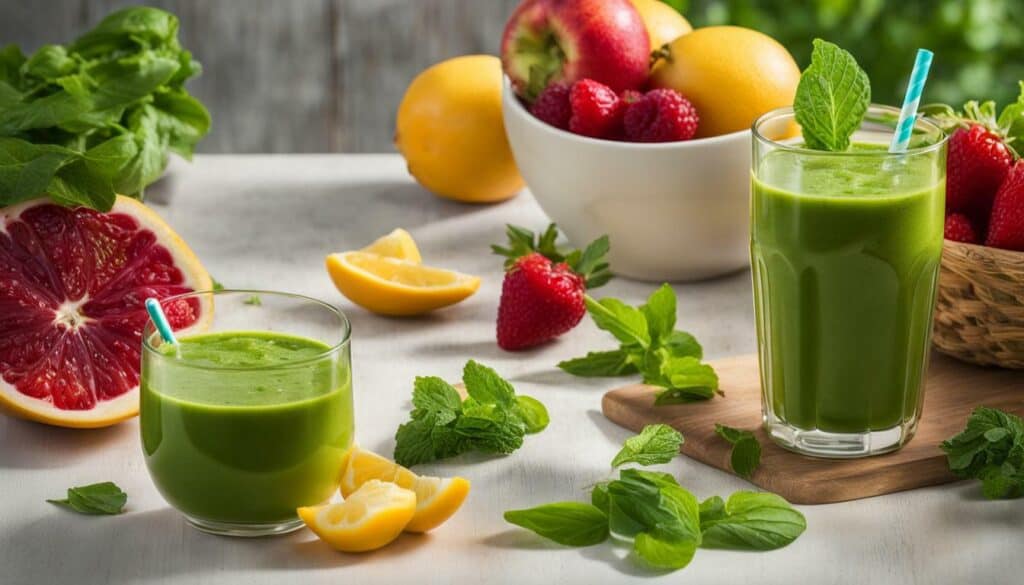Sweet tea is a beloved drink in the Southern United States, but have you ever wondered about the carbohydrates it contains? In this guide, we will explore the nutritional information of sweet tea, including its carbohydrate content, sugar content, and calorie count. Whether you’re watching your carb intake or simply curious about the nutritional value of your favorite beverage, this guide will provide you with all the information you need.
- Sweet tea is a popular beverage in the Southern United States, known for its refreshing taste.
- Authentic sweet tea is made with baking soda to neutralize bitterness and create a smoother flavor.
- Tea, including sweet tea, can be a healthy addition to a low-carb lifestyle, as it is calorie-free and rich in antioxidants.
- There are various flavors and varieties of tea that can be enjoyed on a low-carb diet, such as green tea, oolong tea, and chamomile tea.
- Low-carb iced tea recipes offer delicious alternatives to sweet tea, with flavors like lemon and mint, blueberry, and lemon and ginger.
The Basics of Sweet Tea
Sweet tea is a classic Southern beverage that is made by steeping tea bags in hot water and adding a sweetener such as simple syrup. The secret ingredient to authentic southern sweet tea is baking soda, which helps to neutralize the tannins in black tea, resulting in a smoother taste. Tannins are compounds found in tea leaves that contribute to bitterness. Baking soda can also be used to reduce bitterness in green tea.
Traditionally, sweet tea is made by boiling water and steeping several tea bags in the hot water for a few minutes. Once the tea is brewed, a simple syrup made from water and sugar is added to sweeten the tea to taste. The tea is then chilled and served over ice, often with a garnish of lemon and mint for added freshness.

While sweet tea is a beloved classic, there are also many other flavors and varieties of tea that can be enjoyed. Some popular options include green tea, oolong tea, white tea, chamomile tea, and chai tea. These teas can be enjoyed hot or cold, and there are several low-carb recipes available for making iced tea with various flavor combinations.
Overall, sweet tea is a delicious and refreshing beverage that is a staple in Southern cuisine. By using baking soda to reduce bitterness and controlling the amount of sweetener added, you can create a flavorful sweet tea that fits within a low-carb lifestyle. And if you’re looking to explore other tea options, there are plenty of flavors and varieties to satisfy your taste buds while keeping your carb intake in check.
Understanding Carbohydrates in Sweet Tea
Carbohydrates are a significant component of sweet tea, contributing to its taste and nutrition profile. When it comes to sweet tea, the main source of carbohydrates is the added sugar. The amount of sugar in sweet tea can vary depending on the recipe and personal preference. A standard serving of sweet tea typically contains around 20-30 grams of carbohydrates, with most of it coming from the added sugar.
It’s important to be mindful of the sugar content in sweet tea, especially if you’re watching your carbohydrate intake. Consuming excessive amounts of sugar can lead to weight gain, increased blood sugar levels, and other health issues. However, that doesn’t mean you have to completely eliminate sweet tea from your diet. There are ways to enjoy sweet tea while moderating your carbohydrate intake.
One option is to use a low-calorie sweetener, such as stevia or erythritol, instead of regular sugar. These sweeteners provide the sweetness without the added carbohydrates and calories. Another option is to use less sugar or a combination of sugar and a low-calorie sweetener to reduce the overall carbohydrate content. Experimenting with different sweetener ratios can help you find the right balance between sweetness and carb content.
| Sweet Tea Carbohydrate Content | |
|---|---|
| Serving Size | Carbohydrates |
| 1 cup (8 fl oz) | 20-30 grams |
| 12 fl oz can | 30-45 grams |
| 16 fl oz (medium size at a fast food restaurant) | 40-60 grams |
| 20 fl oz (large size at a fast food restaurant) | 50-75 grams |
Remember, it’s not just the carbohydrates in sweet tea that you need to consider. Sweet tea can also contribute to your total calorie intake. If you’re trying to manage your weight or follow a low-carb diet, it’s important to be mindful of your overall calorie consumption, including the calories from sweet tea. Moderation is key, and it’s always a good idea to consult with a healthcare professional or registered dietitian for personalized advice.

“Choosing low-calorie sweeteners or reducing the amount of sugar in sweet tea can help decrease the carbohydrate content while still enjoying its refreshing flavor.”
The Impact of Sweet Tea on Health
While sweet tea can be a delicious and refreshing drink, it’s important to consider its potential effects on your health. Sweet tea is typically made with added sugar, which can contribute to weight gain and have negative effects on blood sugar levels. It’s important to be mindful of the amount of sweet tea consumed, especially if you’re watching your carbohydrate intake or have diabetes.
According to the USDA National Nutrient Database, a 12-ounce serving of sweet tea can contain around 150 calories and 38 grams of carbohydrates, most of which come from added sugars. Consuming excessive amounts of added sugars can lead to weight gain, increased risk of obesity, and higher blood sugar levels. It’s recommended to limit your intake of added sugars and opt for unsweetened or lightly sweetened beverages instead.
Drinking sweet tea in moderation may not have significant health consequences, but it’s important to be aware of its impact on your overall diet. If you enjoy sweet tea, consider making healthier choices by using less sugar or opting for alternative sweeteners such as stevia or monk fruit. Additionally, balancing your sweet tea consumption with a diet rich in fruits, vegetables, lean proteins, and whole grains can help support overall health and well-being.
| Health Effects | Nutritional Information |
|---|---|
| Weight Gaing | High in calories and added sugars |
| Blood Sugar Levels | Can cause spikes in blood sugar levels |
| Obesity Risk | Excessive consumption may contribute to weight gain and obesity |
“Consuming excessive amounts of added sugars can lead to weight gain, increased risk of obesity, and higher blood sugar levels.”
Overall, it’s important to be mindful of your sweet tea consumption and consider its impact on your health. While it can be enjoyed in moderation, opting for healthier alternatives such as unsweetened tea or lightly sweetened varieties may be a better choice for those looking to maintain a balanced diet and manage their sugar intake.

If you’re following a low-carb diet, there are plenty of tea options available that can satisfy your taste buds without the added carbohydrates. Tea is a versatile beverage that comes in a wide range of flavors and varieties. Whether you prefer a bold and robust taste or a delicate and soothing cup, there’s a tea out there for you. Here are some popular low-carb tea options to consider:
- Green Tea: Green tea is known for its numerous health benefits and refreshing taste. It contains a moderate amount of caffeine and is rich in antioxidants.
- Oolong Tea: Oolong tea is a traditional Chinese tea that falls between green and black tea in terms of oxidation. It has a distinct flavor and can be enjoyed hot or cold.
- White Tea: White tea is the least processed of all teas and has a delicate and subtle flavor. It is low in caffeine and high in antioxidants.
- Chamomile Tea: Chamomile tea is a caffeine-free herbal tea known for its soothing properties. It has a mild floral taste and is often enjoyed before bedtime.
- Chai Tea: Chai tea is a spiced tea blend that originated in India. It typically contains ingredients such as black tea, cinnamon, cardamom, cloves, and ginger. Chai tea can be enjoyed with or without milk.
These low-carb tea options can be enjoyed hot or iced, depending on your preference. To create a refreshing iced tea, simply steep the tea bags in hot water, add your desired sweetener (if necessary), and let it chill in the refrigerator. Serve over ice for a cool and satisfying beverage.

Tea is a wonderful addition to a low-carb diet because it is naturally calorie-free and does not contain any carbs, fat, or sodium. Additionally, tea is hydrating and can help quench your thirst without added sugars or artificial ingredients. Whether you’re looking for a morning pick-me-up or a soothing evening ritual, these low-carb tea options are a great choice.
Low-Carb Iced Tea Recipes
Craving a refreshing iced tea but want to keep it low-carb? Here are some delightful recipes to try at home.
Lemon and Mint Iced Tea
To make this refreshing low-carb iced tea, you will need:
- 4 cups of water
- 4 bags of green tea
- 1 lemon, sliced
- A handful of fresh mint leaves
- 1-2 tablespoons of sweetener (optional)
Start by boiling the water and steeping the green tea bags for 3-5 minutes. Remove the tea bags and allow the tea to cool. Once cooled, add the sliced lemon, mint leaves, and sweetener if desired. Refrigerate the tea for a few hours to infuse the flavors before serving over ice.
Blueberry Iced Tea
For a fruity twist on classic iced tea, try this blueberry-infused version. Here’s what you’ll need:
- 4 cups of water
- 4 bags of black tea
- 1 cup of fresh or frozen blueberries
- 1-2 tablespoons of sweetener (optional)
Bring the water to a boil and steep the black tea bags for 3-5 minutes. Remove the tea bags and add the blueberries to the hot tea. Let the mixture cool and then strain out the blueberries. Add sweetener if desired and chill the tea in the refrigerator. Serve over ice for a delicious low-carb blueberry iced tea.
Lemon and Ginger Iced Tea
For a zesty and invigorating iced tea, try this lemon and ginger combination. Here’s what you’ll need:
- 4 cups of water
- 4 bags of herbal ginger tea
- 1 lemon, sliced
- 1-2 tablespoons of sweetener (optional)
Bring the water to a boil and steep the ginger tea bags for 5-7 minutes. Remove the tea bags and add the sliced lemon to the hot tea. Allow it to cool before adding sweetener if desired. Chill in the refrigerator and serve over ice for a tangy low-carb lemon and ginger iced tea.

If you’re looking for low-carb iced tea recipes, you’re in luck. Try the refreshing lemon and mint iced tea, the fruity blueberry-infused iced tea, or the zesty lemon and ginger iced tea. These recipes are perfect for hot summer days or any time you want a delicious, low-carb beverage. Enjoy the flavors and stay hydrated with these delightful homemade iced teas.
Making Sweet Tea Low-Carb-Friendly
Don’t worry, you can still enjoy sweet tea while following a low-carb lifestyle. Here’s how to make it more diet-friendly:
- Use baking soda to reduce bitterness: Adding a pinch of baking soda to your steeping tea can help neutralize the tannins and reduce bitterness. This trick works well with both black tea and green tea.
- Control the sweetener: Instead of using traditional simple syrup made from sugar, opt for a low-carb sweetener like stevia or erythritol. These options provide sweetness without the added carbs and calories.
- Experiment with natural flavors: Enhance the flavor of your sweet tea without adding carbs by infusing it with natural flavors. Try adding a slice of lemon, a sprig of mint, or a dash of vanilla extract to your tea for a refreshing twist.
By using these simple strategies, you can enjoy a delicious glass of sweet tea without compromising your low-carb lifestyle. Remember, moderation is key, so be mindful of your portion sizes and adjust the sweetness to your preference.

| Sweetener | Carbohydrates per Teaspoon | Calories per Teaspoon |
|---|---|---|
| White Sugar | 4 grams | 16 calories |
| Stevia | 0 grams | 0 calories |
| Erythritol | 0 grams | 0 calories |
Remember to listen to your body and adjust your sweet tea recipe to suit your individual needs and preferences. With a little creativity and the right ingredients, you can enjoy the taste of sweet tea while staying on track with your low-carb goals.
Tea as a Healthy, Hydrating Beverage
Drinking tea, whether it’s sweetened or unsweetened, can offer a range of health benefits in addition to its delicious taste. Tea is a hydrating beverage that can help quench your thirst while providing a natural source of hydration. It contains zero calories and is free from sodium, fat, carbonation, and sugar, making it a great choice for those looking to maintain a healthy diet.
One of the key reasons why tea is often praised for its health benefits is its high antioxidant content. Antioxidants are compounds that help protect our cells from damage caused by free radicals, which are unstable molecules that can contribute to chronic diseases and aging. Tea, especially green tea, is rich in antioxidants called polyphenols. These compounds have been shown to have anti-inflammatory properties and may help reduce the risk of certain chronic conditions, such as heart disease and certain types of cancer.
Additionally, drinking tea has been associated with various other health benefits. Research suggests that regularly consuming tea, particularly green tea, may aid in weight management by boosting metabolism and promoting fat oxidation. It may also help regulate blood sugar levels, potentially reducing the risk of developing type 2 diabetes. Furthermore, some studies indicate that tea consumption may have a positive impact on brain health, improving cognitive function and reducing the risk of neurodegenerative diseases like Alzheimer’s.
| Tea Type | Antioxidant Level |
|---|---|
| Green Tea | High |
| White Tea | Medium |
| Oolong Tea | Medium |
| Black Tea | Low |
Whether you prefer your tea hot or cold, there are plenty of low-carb options to choose from. Green tea, oolong tea, white tea, chamomile tea, and chai tea are all popular choices that can be enjoyed without the guilt. For those hot summer days, you can even try making your own low-carb iced tea with flavor combinations like lemon and mint, blueberry, or lemon and ginger. Simply steep the tea bags in hot water, add your desired sweetener if desired, and chill the tea before serving over ice.

In conclusion, tea is not only a refreshing and flavorful beverage but also a healthy addition to a low-carb lifestyle. It provides hydration, is calorie-free, and contains high levels of antioxidants. Whether you enjoy your tea sweetened or unsweetened, it can offer a range of health benefits, including weight management, blood sugar regulation, and protection against chronic diseases. So go ahead, pour yourself a cup of tea and savor both the taste and the wellness it brings.
Conclusion
Sweet tea may be a beloved beverage, but it’s important to be mindful of its carbohydrate content and consider the potential effects on your health. Authentic southern sweet tea, made with baking soda to neutralize the bitterness of tea leaves, is a traditional favorite. However, there are many other flavors and varieties of tea that can be enjoyed on a low-carb diet.
Tea, including sweet tea without added sugar, can be a healthy addition to a low-carb lifestyle. It is calorie-free, hydrating, and rich in antioxidants called polyphenols, which have anti-inflammatory properties. Green tea, in particular, has been associated with various health benefits, including weight management, improved blood sugar levels, reduced risk of heart disease, and protection against certain types of cancer.
If you’re looking for low-carb alternatives to sweet tea, consider trying green tea, oolong tea, white tea, chamomile tea, or chai tea. These varieties offer a range of flavors and can be enjoyed hot or cold. For a refreshing twist, you can also experiment with different low-carb iced tea recipes, such as lemon and mint, blueberry, or lemon and ginger. These recipes typically involve steeping tea bags in hot water, adding sweetener if desired, and chilling the tea before serving over ice.
In summary, sweet tea can still be enjoyed on a low-carb diet by controlling the amount of sweetener added and using baking soda to reduce bitterness. However, there are many other low-carb tea options available that provide a variety of flavors and health benefits. Tea, in general, is a hydrating and calorie-free beverage that can contribute to a balanced and healthy lifestyle. So, go ahead and savor a delicious cup of tea while keeping your carbohydrate intake in check!
FAQ
Q: How is sweet tea traditionally made?
A: Sweet tea is made by steeping tea bags in hot water and adding a simple syrup made from water and sugar.
Q: What is the secret ingredient in authentic southern sweet tea?
A: The secret ingredient is baking soda, which helps to neutralize the tannins in black tea and create a smoother taste.
Q: Is sweet tea low in carbohydrates?
A: Sweet tea does contain carbohydrates due to the sugar used to sweeten it. The exact amount will depend on the recipe and personal preference.
Q: Can I enjoy tea on a low-carb diet?
A: Yes, unsweetened tea is a great low-carb option. It is calorie-free and free from sodium, fat, carbonation, and sugar.
Q: What are the health benefits of drinking tea?
A: Drinking tea, especially green tea, has been associated with various health benefits, including weight management, improved blood sugar levels, reduced risk of heart disease, and protection against certain types of cancer.
Q: Are there low-carb alternatives to sweet tea?
A: Yes, there are many other flavors and varieties of tea that can be enjoyed on a low-carb diet, such as green tea, oolong tea, white tea, chamomile tea, and chai tea.
Q: Can I make low-carb iced tea?
A: Absolutely! There are several low-carb recipes available for making iced tea with various flavor combinations, such as lemon and mint, blueberry, and lemon and ginger.
Q: How can I make sweet tea more low-carb friendly?
A: You can use baking soda to reduce bitterness in sweet tea and control the amount of sweetener added to make it more suitable for a low-carb diet.
Q: Is tea a healthy and hydrating beverage?
A: Yes, tea is hydrating and contains antioxidants called polyphenols, which have anti-inflammatory properties. It is a calorie-free beverage that provides a variety of health benefits.
How Many Calories are in Sweet Tea?
Are you wondering about the garlic bread calorie breakdown, specifically in the context of sweet tea? While the keyword might not directly relate to the topic, it’s important to tackle the question at hand. The number of calories in sweet tea varies based on the recipe and serving size. On average, an 8-ounce glass of sweet tea can contain around 70-100 calories, mainly derived from sugar and possibly added flavorings. Remember to consider portion sizes and added ingredients when calculating the calorie content of your sweet tea.





Leave a Reply